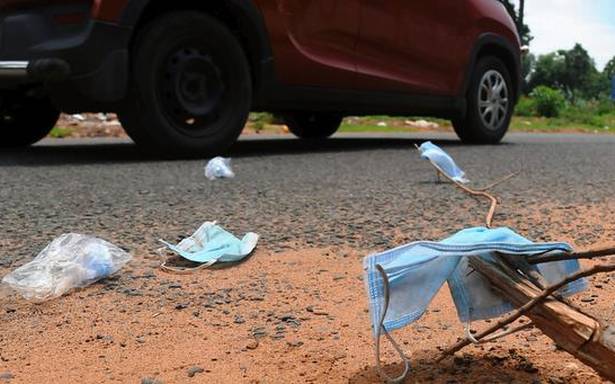Ensuring safe disposal of the face-wear is the responsibility of the individual and the community
The Green Team at House of Hiranandani Upscale in Egattur has circulated an updated waste segregation chart, which among other things takes them through handling used or unwanted masks.
Educating residents about scientific disposal of used masks, gloves and other COVID-related waste should be an ongoing exercise, repeated till the right action becomes a habit.
Rajeswari Harish, a core member of Green Team, says, “We have tied up with a vendor who collects our dry and reject waste with the latter being taken to an incinerator,” says Rajeswari, adding that follow-ups and monitoring are particularly necessary to ensure residents get their part of the reject-waste handling process right.
Following complaints, the management committee at Prestige Bellavista, a gated community at Iyyappanthangal, sent out a circular urging residents to adhere to the waste management guidelines.
“Garbage removal will not be done unless it is segregated as wet waste, dry waste and sanitary waste. We request all the residents to view this very seriously and keep the garbage segregated failing which their garbage bins will not be emptied by the house keeping staff,” reads the note.
Apartments complexes and independent houses that are dependent on Greater Chennai Corporation’s conservancy workers point out that the knowledge about reject waste is limited.
“At my apartment complex in Mylapore, I flagged residents who had thrown masks in the open,” says Jennifer Ann, adding that carelessness by residents and poor enforcement by the residents’ welfare association can lead to mask pollution, which is a health hazard.
Rajeswari also agrees that littering the open spaces residential complexes with masks has to be dealt with firmly.
“With great struggle, we put various solid waste management practices and processes in place three years ago. One important step was to educate and empower our house-keeping staff. They inform us when there is non-compliance by residents, sometimes bringing it to our notice through photographs. You may not penalise these residents but constantly push them towards better waste-management behaviours. We send residents related messages through various platforms. The children at the community have also been trained to spread these messages,” says Rajeswari.
The Green Team at House of Hiranandani Upscale has three to four members in every tower who are responsible for creating awareness about waste management and clarifying residents’ doubts in the matter.
“And this also includes sending out messages on how to dispose of masks and other COVID-related waste for which we give special bags given to residents,” explains Rajeswari, who also makes a case for having a separate bin to dispose of masks in common areas.
Wrap it right before you drop it
A recent survey conducted by the Department of Community Medicine at Government Omandurar Medical College Hospital reveales that not many commercial establishments have facilities in place to ensure safe disposal of masks.
As it is an interim study, it does not offer any recommendations on what the health department and other authorities can do for safer disposal of masks.
R Jayanthi, the hospital’s dean, points out that the second phase of the survey could cover this aspect.
She believes installing collection bins in different parts of Chennai to drop used masks is not a sustainable solution.
“As far as possible, use the reusable cloth masks as doing so would considerably reduce our disposable-waste footprints,” says Dr Jayanthi. The mask has to be disinfected and then sundried, before being reused.
Dr Jayanthi says the mask should be folded into half, rolled and wrapped with the ear loops. It must then be wrapped with a paper before being disposed of. This process is fine except when the person has tested positive for COVID-19. Then, this waste must be treated separately, she says.
Source: Read Full Article

